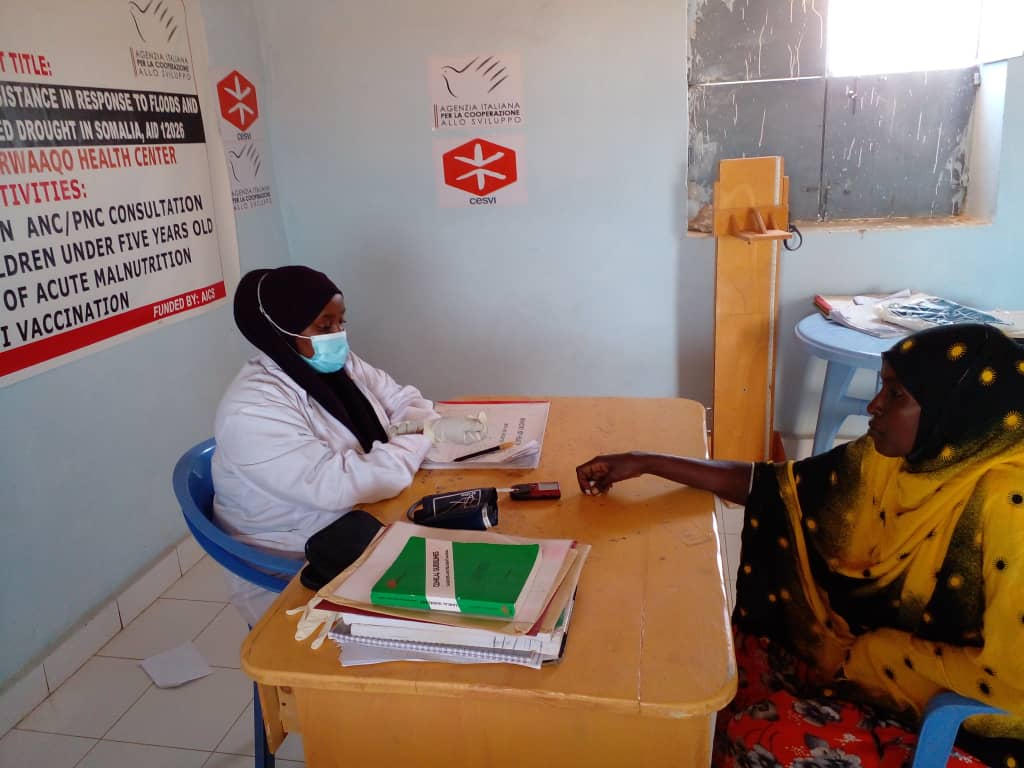“We were living a simple and happy life before the 2017 drought”, tells us Nadifo, a 30-year-old woman, mother of 4 children aged between 7 months to 6 years, who at the time of the Sima drought that hit Somalia was forced to leave with her whole family their hut to find shelter in a village. “Back then, we had 100 counts of livestock that we herded in the small hamlet of Laasahawiye, in the outskirts of Galbarwaaqo”, recounts Nadifo, “but after the drought, we lost 80 of our animals and my husband was forced to sell the remaining 20 to set up a shabby shelter in Galbarwaaqo”. Drought and famine have killed all their animals and also their 7-month-old baby was dying of starvation.
What has happened to Nadifo’s family is not an isolated case.
Climate change is having a devastating impact on the entire society in Somalia, mainly affecting the most vulnerable, such as women and children. Malnutrition increases, poverty is on the rise and more and more people, like Nadifo, are forced to displace to look for safer places to keep their children alive. It is estimated that in 2019 thousands of people were forced into displacement because of the failure of the harvest and the reduced profitability of the livestock. Worsening the situation, an important area of the country, the one where Nadifo used to live, has been repeatedly affected by desert locust infestations, leading to the destruction of the few remaining pastures and the contamination of the water used by both the population and the animals. To all this is added the ongoing conflict caused by the presence of Al-Shabaab in the region, a severe threat to the safety and security of the communities and of entire families.
The journey to reach the village of Galbarwaaqo has not been easy and free from dangers. The whole family was severely malnourished and Nadifo was pregnant with her fourth child. But it is right here that the encounter with Cesvi occurs, the only organisation in the area providing healthcare services to the entire community. In particular, Cesvi is focusing on mother-child health and nutrition through the project “Multisectoral humanitarian assistance in response to floods and consequences of prolonged drought in Somalia”, financed by AICS – the Italian Agency for Cooperation and Development. “My children and I were sick all the time, but thanks to God Cesvi saved us and gave us medicines and food. Now, I regularly visit Cesvi’s health centre and 3 of my children are registered in the nutrition program”, recalls Nadifo.
During her past pregnancies, Nadifo experienced many complications ranging from anaemia, nausea, constant abdominal pain, bleeding and fever. Often, she was so sick that she could not help her family and attend to her children. At the time, the closest health centre she could get to was in Galkayo, over 80km away from her village and impossible to reach for the high cost of the rental car to travel to the city. Now, Nadifo can access basic healthcare services for herself and her children thanks to Cesvi’s health centre in the village. “Now all those pains, doubts and uncertainties are gone. We have qualified and competent people helping me day and night whenever I need them”. Nadifo visits the centre every week to regularly meet with Cesvi’s midwife. “Weekly, after the medical visit, I receive medications, counselling and support for my pregnancy. The health staff in the centre are extremely supportive and friendly. The midwife checks my health condition and my haemoglobin, then she prescribes my medications, vitamins and iron folic tablets to control my anaemia. Furthermore, at the centre, they distribute mosquito nets to protect us and our families from malaria”.
As we said, Cesvi is the only organisation in this area with projects of this kind. Before Cesvi opened the mother-child health centre, many pregnant women were experiencing the same problems Nadifo was suffering from. “There were a lot of pregnant women who were malnourished and I can remember that every day I used to see one family renting a car to take a pregnant woman with complications to Galkayo”, she recalls. “Without Cesvi’s intervention, there would have been a lot of maternal deaths due to a lack of life-saving childbirth interventions”, she continues.
Now, Nadifo aspired to become a trained birth attendance. “I am motivated to become a midwife who helps other women who are going through the same conditions as me”. She hopes to open a clinic in the village to provide medical support, counselling and awareness on maternal health to help all women in need.
